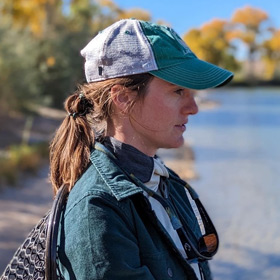Tips Before Going Fly Fishing: Best fishing tips for beginners
By Melissa Ceren LPCC, M.Ed., Ed.S.
Aug 18, 2023
Learning how to fly fish can feel intimidating. These tips will help you to get started and support you as you continue your learning on the water.
After I went on my first guided fly fishing trip, I left feeling like the sport was too complex for me to understand. Luckily, I gave it another chance and was propelled by passion to learn what felt unlearnable. One of the things that helped me was reading about fishing preparation tips that I could use with my own practice as well as when I’m teaching others as a fly fishing guide.
Getting into fly fishing can be intimidating. It feels like a whole world of unknown you need to learn right away. What I have come to understand is that you don’t need to know it all to be successful. You just need to be observant of fish behavior and follow some of these tips. This list of fishing tips for beginners can act as your cliff notes to fly fishing!
1. Mending is crucial for a proper “dead drift.” Meaning, it is important to adjust your fly line after casting so that the water does not pull your flies and create an unnatural movement. The goal is a “dead drift” which means that your fly appears like an insect floating down the water.
2. Use “confidence flies” — parachute adams, leeches, worms, pheasant tails, RS2s, and zebra midges work in most situations.
3. Practice knots in your down time, both to improve muscle memory and to reduce frustration on the water.
4. Hook sets are free! When nymphing (fishing sub-surface flies to imitate early life cycle bugs), fish takes can be very subtle. Set the hook on any variation in your indicator’s (AKA bobber in spin rod fishing) movement while drifting down the river or floating on a lake.
5. Get everything ready to go the night before your trip to reduce stress and wasted time in the morning.
6. Adding/reducing weight (split shot and weighted flies) when nymphing should be the first thing you change before anything else.
7. Be a sponge — talk to the workers at your local fly shop, watch instructional videos, read books, and listen to fly fishing podcasts.
Trust the learning process
After several years of fly fishing consistently, I am still regularly learning new tips and aspects of fly fishing. That’s to say that the learning never stops, so you do not (and will not) need to master it right away. Have some patience for yourself and the process.
One last fishing tip for success — keep a digital or written angler’s journal. There, you can document what is working for you, advice from others, and recommended fishing locations. Not only will this document your progress as a memento, but you can revisit old advice when you’re feeling stuck.
Enjoy the process of achieving your first few hard-earned victories; you’ll never be new to fly fishing again!









